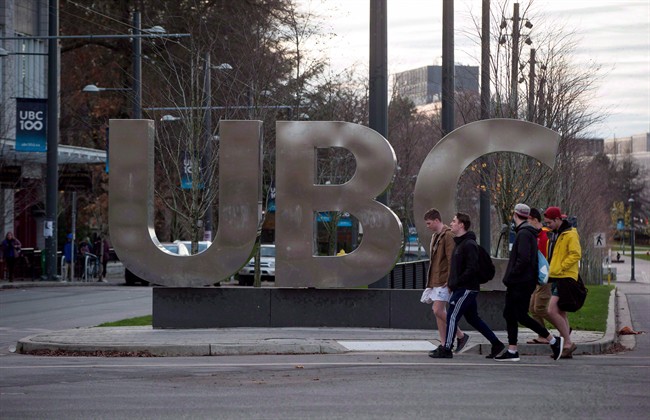VANCOUVER – The University of British Columbia is set to vote on a new sexual misconduct policy in the wake of allegations it mishandled complaints against a PhD history student and former creative writing chairman Steven Galloway.

The board of governors will vote on the policy Thursday and if it passes, UBC will become the latest school to implement guidelines ahead of a May deadline set by the B.C. government.
“Putting together a policy is definitely a part of healing,” said Genevieve Cruz, a graduate student who helped write the document.
Cruz, president of the Graduate Student Society and a member of the history department, said the community was deeply affected by complaints that the university delayed taking action on multiple reports about a PhD student.
READ MORE: Universities in B.C. hiring sex-assault experts to investigate allegations
“The sense of community, of safety, was suddenly a question on everyone’s minds. There is an effect to the UBC community when something like this doesn’t get addressed.”
The new policy would establish centralized sexualized violence prevention and response offices at UBC’s Vancouver and Okanagan campuses. The offices would receive reports, refer complainants to support services and, if requested, provide information about the investigation process.
Directors of investigations would also be hired to review reports within 14 days and decide whether the university has jurisdiction. Reports could then be passed to external investigators with sexual assault training, who would have 60 days to complete their work.

Get daily National news
Former interim president Martha Piper announced the school would create a policy in November 2015, shortly after the history department scandal erupted and after Galloway was suspended.
- B.C. 2026 budget ‘neither’ big cuts nor tax increase, minister says
- Former Conservative leader John Rustad says he’s not running for his old job
- Parts of B.C.’s South Coast set to see snow-rain mix with ‘rapidly changing’ travel conditions
- Survivor of one of Canada’s first school shootings reflects on Tumbler Ridge grief
Galloway has denied a former student’s allegation of sexual assault, saying the university’s investigator found that all but one of the allegations against him, including the most serious, were not substantiated.
The acclaimed author was fired last June and was set to go to labour arbitration in March, but UBC declined comment “out of respect for the labour relations process.” Both sides in the Galloway case have complained about the university’s handling of the situation.
READ MORE: Professor quits UBC sexual assault committee over reinstated John Furlong speech
Like many other universities in Canada, UBC has lacked a standalone sexual assault policy. An independent review of the history department case found that while staff acted in good faith, miscommunications and an unclear process led to months-long delays.
For allegations against students, the school has relied on a combination of a sexual harassment and a non-academic misconduct policy, which allowed a panel of students to judge whether an attack occurred. Complaints against faculty were made to department heads.
“The practice before had been much more diffuse, with no guarantee that someone would end up disclosing a sexual assault to someone who knew what to do,” said Margot Young, a law professor who helped create the policy.
The B.C. government passed a bill in May 2016 giving post-secondary institutions one year to establish sexual misconduct policies. The University of Victoria and Simon Fraser University passed their policies late last month.
UBC’s policy has been revised twice following periods of public consultation. It applies to students, faculty and staff and broadly defines sexual misconduct to include sexual assault, harassment, stalking, indecent exposure and voyeurism.
It also clarifies the difference between a disclosure and a report. Community members may disclose that a sexual assault occurred and access support services without making a formal report, which may trigger an investigation.
The university will annually publish the number of disclosures and reports it receives, as well as the number of reports investigated or referred to an alternative dispute resolution process, the policy says.
Wayne MacKay, a law professor at Dalhousie University who led a report on the 2013 “rape chants” at Saint Mary’s University in Halifax, said there are many reasons why schools should have specific procedures to respond to sexual assaults.
Universities have a responsibility to students to ensure that, as much as possible, they are free from sexual violence, he said. The burden of proof may also be lower in a university process than in a criminal process, he added, and both can take place at the same time.
“It’s not one or the other,” he said. “Hopefully, the university process will be much more speedy.”






Comments
Want to discuss? Please read our Commenting Policy first.